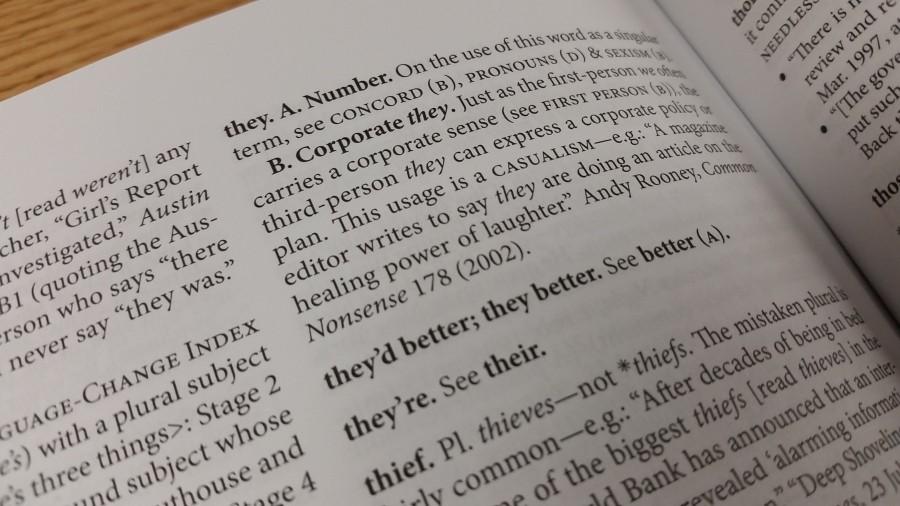Singular “they” named the Word of the Year
Catherine Huang
The “they” entry in “Garner’s Modern American Usage” redirects to sections on concord, pronouns, and sexism. The singular they is currently considered a grammatical mistake in formal writing at Harker, according to the Bedford Handbook.
February 23, 2016
The American Dialect Society named the singular “they” the 2015 word of the year on Jan. 8, and its use as a singular pronoun has recently gained popularity as a topic of discussion in the context of usage in daily life, as well as in formal writing. “They” garnered 187 votes, while the runner up earned 76, and the rest falling below that.
On Dec. 4 2015, The Washington Post adopted the singular “they” into its official style guide, referencing transgender people who use they/them/their/ as gender neutral pronouns.
The Oxford Dictionary references how it has been used since the 16th century by prominent writers such as Shakespeare, Chaucer, and Jane Austin, and is now widely accepted in the English language.
Anthony Ross, a transgender man and the Outlet Program Director, helps LGBTQQ+ teens through support and advocacy. He feels that the singular “they” should be acceptable in formal writing, especially in reference to transgender people who would like to be referred to in a gender neutral manner.
“My opinion is that it should be used when it’s appropriate for identifying folks who use ‘they’ and ‘them’ and a pronoun for themselves and wherever else it seems appropriate,” he said. “Most people assume [these pronouns] are supposed to be plural, but ‘they’ has actually been used in the singular way for years and years by writers, like Shakespeare, and Chaucer, and Jane Austen. It’s just lack of understanding and knowledge that people struggle with these pronouns being used as a singular.”
For example, In Jane Austen’s “Pride and Prejudice,” character Jane Bennet uses the singular “they” when she says, “But to expose the former faults of any person, without knowing what their present feelings were, seemed unjustifiable.” In Austen’s work “Mansfield Park” the singular “they” is used 24 times, and it is used 12 times in “Pride and Prejudice”
Shakespeare uses it in “A Comedy of Errors” in Act IV, Scene 3: “There’s not a man I meet but doth salute me / As if I were their well-acquainted friend.”
Some transgender people may not identify within the binary of male and female, and wish to use gender neutral pronouns to refer to themselves. Oftentimes, these people use “they/them/their/themself” as their pronouns instead of “he/him/his/himself” or “she/her/hers/herself.”
“I think people need to understand that trans folks are a highly marginalized community and simple language use that’s respectful for what they desire and need is vital for their wellbeing,” Ross said.
Deb Chatterjee (10), a student who uses they/them/their pronouns, also thinks that people should be allowed to use the singular “they” in formal writing.
“It’s been correct in British English for a very long time so I think it’s time American English hopped on that,” they said.
Kelly Corcoran, PhD student of Linguistics at UC Davis, studies the usage of words. She thinks that the singular “they” can solve some problems in writing, as there is currently no singular gender neutral pronoun that is universally accepted.
“As a linguist who crucially is interested in describing language use, I have no opinion/judgement on the use or non-use of any particular form. This is contrasted with people like copy editors and language educators, who are interested in prescribing a standard and therefore particular forms, especially for formal writing,” she said. “As a (feminist) writer, I think it’s the best/efficient/logical solution to dealing with a number of pronoun related problems in English, including cases where the gender is unknown, the referent is hypothetical and gender is not specified, and for individuals who prefer it.”
Harker follows the Bedford Handbook’s rules for grammar, and it suggests that writers use “he or she,” pluralize the noun, or rewrite the sentence in order to avoid sexist language. It states that using “he or she” may be awkward if used multiple times.
“Because we’re using the Bedford Handbook, we need to follow the rules of the Bedford Handbook,” Pauline Paskali, head of the English department, said. “I believe that we should, as an English department, come up with a new rule for the personal pronoun, but until then, we’re following the Bedford Handbook. So, for formal writing, we have to follow the Bedford Handbook.”
At Harker, students are not currently allowed to use the singular “they” in literary analysis papers where characters and authors clearly identify within the binary, but may use it when appropriate in personal narratives.
Dr. Paskali recalls learning about the generic “he” to refer to people when she was younger, and how formal writing has already changed to avoid sexist language.
“When I was in second grade, my English teacher told me we had to use ‘he’ to speak about a general person, and I remember at the time that that really bothered me. And then the grammar books at the time also required you to use the personal pronoun ‘he’ to refer to everybody,” Paskali said. “Now, in our grammar books, we are encouraged in the Bedford, there’s a chapter that says avoiding sexist language, we’re encouraged to use ‘he and she’ or to make it plural.”
While the rules state that writers must work around using this pronoun, they may change in the future.
“I brought up [my English teacher] in second grade with the ‘he’ and the ‘she’ because I think that you can see how even in my time, how language, formally, has adapted to the changes,” Paskali said. “So, of course people say ‘they’ and eventually, people will say they in formal writing too, but the grammar books haven’t caught up yet.”
Other English teachers feel that the rules do not need to change to allow for the usage of the singular “they” in formal writing.
“I think in formal writing it’s still improper to make a pronoun-antecedent agreement error,” Charles Shuttleworth, Honors English 1 teacher, said. “Certainly, it’s perfectly okay in conversation. I wouldn’t even consider it a conversational error, but when you have the time to write, it’s an avoidable mistake.”
Some English teachers actually prefer the usage of the singular “they” in formal writing to avoid awkwardness, but tell students to follow Harker’s rules.
“I think it’s fine, and it’s what I prefer,” Ohad Paran, British Literature teacher, said. “It’s imperfect, however, because grammatically it doesn’t really work. So, I’m very explicit in my instruction when we’re dealing with pronoun case in class. I tell the students that the MLA recommends that they use ‘he or she’ and ‘him or her’ as opposed to the ‘they’ in the singular.”
Honors American Literature teacher Nicholas Manjoine feels hesitant to allow it because it breaks rules of grammar, but also wishes to explore its usage.
“I’m really torn about it, because I feel like I want to be supportive of people’s working out or exploration of their own perceptions of themselves, and how they integrate into society, but on the other hand it’s kind of unknown territory in terms of writing because it breaks all of the rules of grammar,” he said.
Recently, grammar has been shifting to accommodate the experiences of transgender people who wish to use the singular “they,” rather than introducing a new pronoun into the language.
“I read that article in the New York Times and ‘they’ is the word of the year, and I’m clearly behind the curve. But I read the article and it makes perfect sense, because this is what’s happening right now,” Brigid Miller, Honors American Literature teacher, said. “People aren’t identifying as specifically male or female. So the grammar follows that; I’m all about it, I’m not going to force someone to make that choice.”
Kelly Corcoran thinks that the singular “they” could be adopted into English as an accepted pronoun because people have already begun to use it.
“Given that singular they is already in common use, there’s no linguistic barrier, like having to learn a new pronoun set, for speakers to do this,” she said.
Charles Shuttleworth feels that there should be a different pronoun to avoid confusion about the plurality of the subject.
“While I understand that, I wonder if there is an alternative to ‘they,’ though, because that suggests plural, which doesn’t quite make sense to me,” he said.
For example, Spivak pronouns such as ze/zim/zir are singular, gender neutral pronouns and their only purpose is to refer to people in a gender neutral way.
“Something like that could work, just as Ms. was invented. I wouldn’t say that ‘they’ is the right way. But sure, we can invent something,” Shuttleworth said.
In the English language, no easy workaround exists for referring to an individual without using “he” or “she.”
“It’s interesting because it underscores a shortcoming in our language, or a deficiency in our language where our language doesn’t kept up with, or doesn’t reflect current societal values,” Scott Paterson, Latin teacher, said.
Additionally, in Latin, there is a singular pronoun called “neuter” that means “neither” and could be used as a substitute for “they.”
“There are three [pronouns], there is masculine, feminine, and ‘neuter,’” Paterson said. “So yes, neuter could be considered an alternative to if one did not want to be referred to as masculine or feminine. What neuter literally means is ‘neither,’ it’s neither masculine, nor feminine.”
Additionally, Sweden officially added the gender neutral pronoun “hen” into its national encyclopedia, released in April 2015. “Hen” is an alternative to he, “han,” and she, “hon,” and was introduced in the 1960s.
Though the usage of the singular “they” is a widely debated topic today, it may become integrated into acceptable English writing in the future.


















![“[Building nerf blasters] became this outlet of creativity for me that hasn't been matched by anything else. The process [of] making a build complete to your desire is such a painstakingly difficult process, but I've had to learn from [the skills needed from] soldering to proper painting. There's so many different options for everything, if you think about it, it exists. The best part is [that] if it doesn't exist, you can build it yourself," Ishaan Parate said.](https://harkeraquila.com/wp-content/uploads/2022/08/DSC_8149-900x604.jpg)




![“When I came into high school, I was ready to be a follower. But DECA was a game changer for me. It helped me overcome my fear of public speaking, and it's played such a major role in who I've become today. To be able to successfully lead a chapter of 150 students, an officer team and be one of the upperclassmen I once really admired is something I'm [really] proud of,” Anvitha Tummala ('21) said.](https://harkeraquila.com/wp-content/uploads/2021/07/Screen-Shot-2021-07-25-at-9.50.05-AM-900x594.png)







![“I think getting up in the morning and having a sense of purpose [is exciting]. I think without a certain amount of drive, life is kind of obsolete and mundane, and I think having that every single day is what makes each day unique and kind of makes life exciting,” Neymika Jain (12) said.](https://harkeraquila.com/wp-content/uploads/2017/06/Screen-Shot-2017-06-03-at-4.54.16-PM.png)








![“My slogan is ‘slow feet, don’t eat, and I’m hungry.’ You need to run fast to get where you are–you aren't going to get those championships if you aren't fast,” Angel Cervantes (12) said. “I want to do well in school on my tests and in track and win championships for my team. I live by that, [and] I can do that anywhere: in the classroom or on the field.”](https://harkeraquila.com/wp-content/uploads/2018/06/DSC5146-900x601.jpg)
![“[Volleyball has] taught me how to fall correctly, and another thing it taught is that you don’t have to be the best at something to be good at it. If you just hit the ball in a smart way, then it still scores points and you’re good at it. You could be a background player and still make a much bigger impact on the team than you would think,” Anya Gert (’20) said.](https://harkeraquila.com/wp-content/uploads/2020/06/AnnaGert_JinTuan_HoHPhotoEdited-600x900.jpeg)

![“I'm not nearly there yet, but [my confidence has] definitely been getting better since I was pretty shy and timid coming into Harker my freshman year. I know that there's a lot of people that are really confident in what they do, and I really admire them. Everyone's so driven and that has really pushed me to kind of try to find my own place in high school and be more confident,” Alyssa Huang (’20) said.](https://harkeraquila.com/wp-content/uploads/2020/06/AlyssaHuang_EmilyChen_HoHPhoto-900x749.jpeg)










